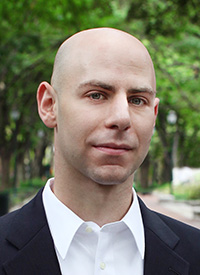In this week’s eSkeptic:
Dr. Adam Grant, on Demand
Give and Take: A Revolutionary
Approach to Success
In this lecture, based on his book on the psychology of human interactions, organizational psychologist Dr. Adam Grant (the youngest tenured professor at the Wharton Business School) argues that as much as hard work, talent and luck, the way we choose to interact with other people defines our success or failure. Give and Take demolishes the “me-first” worldview and shows that the best way to get to the top is to focus not on your solo journey but on bringing others with you. Grant reveals how one of America’s best networkers developed his connections, why a creative genius behind one of the most popular shows in television history toiled for years in anonymity, how a basketball executive responsible for multiple draft busts turned things around, and how we could have anticipated Enron’s demise four years before the company collapsed—without ever looking at a single number.
Rent this video for only $3.95 or
Watch the entire series for $49.
INSTRUCTIONS: Click the button above, then click the RENT ONE button on the page that will open in your Internet browser. You will then be asked to login to your Vimeo account (or create a free account). Once you complete your purchase of the video rental, you will then be able to instantly stream the video to your computer, smartphone, or tablet, and watch it for the rental period. Videos play best on Vimeo when you allow the entire video to buffer before viewing it.


Dr. Todd Disotell & Natalia Reagan
MonsterTalk # 84
New MT on the Bounty
The 10 Million Dollar Bigfoot Bounty television contest is over and we’re going to talk to the science advisers for the show to see how they felt about the outcome. Did science win the day? Did editing take away the good take-aways? Will Justin Smeja be getting in trouble for hunting feral humans? Check it out in this episode of MonsterTalk!

NEW ON SCIENTIFIC AMERICAN COLUMN ON MICHAELSHERMER.COM
The Myth of Income Inequality:
The American Dream is Not Dead Yet
Are the rich getting richer while the poor get poorer? In Michael Shermer’s June 2014 ‘Skeptic’ column for Scientific American, he takes a look at the accuracy of our perceptions about income equality and social mobility.
One of the best-selling books of 2014 is Capital in the Twenty-First Century by French economist Thomas Piketty, a 696-page doorstop tome on economic history. Why is a data-heavy treatise from the “dismal science” so appealing? Because it is about income inequality and immobility, which in a December 2013 speech President Barack Obama called “the defining challenge of our time,” concluding that it poses “a fundamental threat to the American dream.” But does it? Maybe not. Continue reading…












